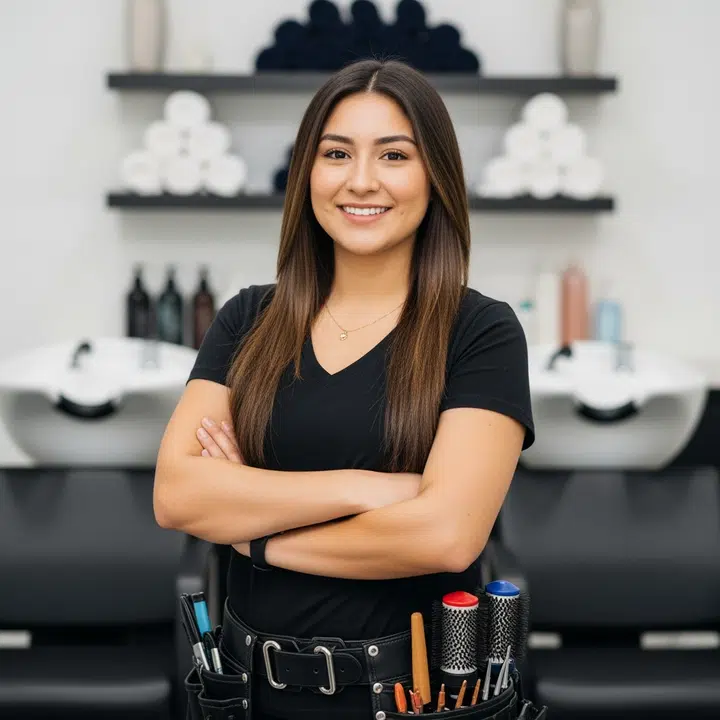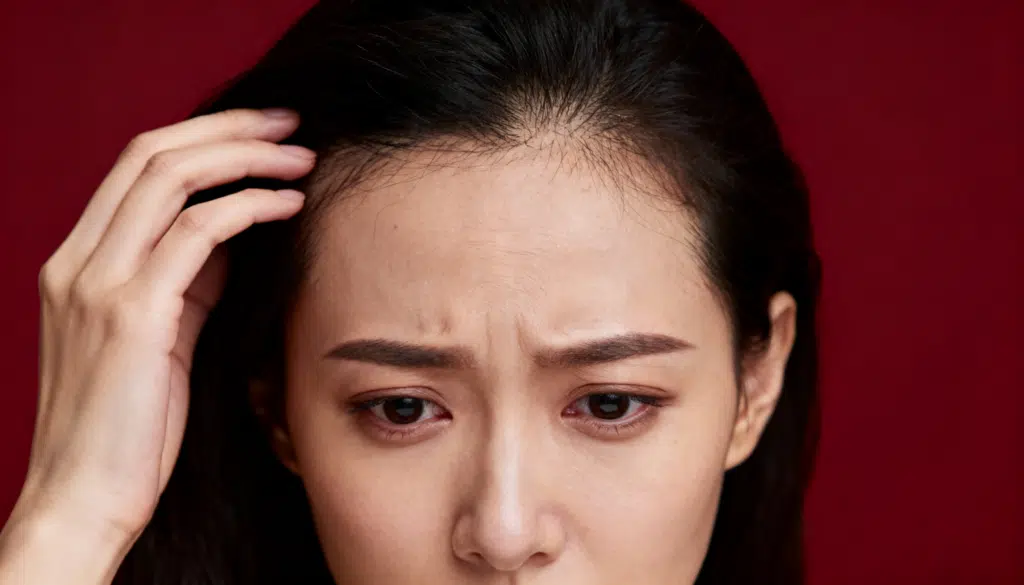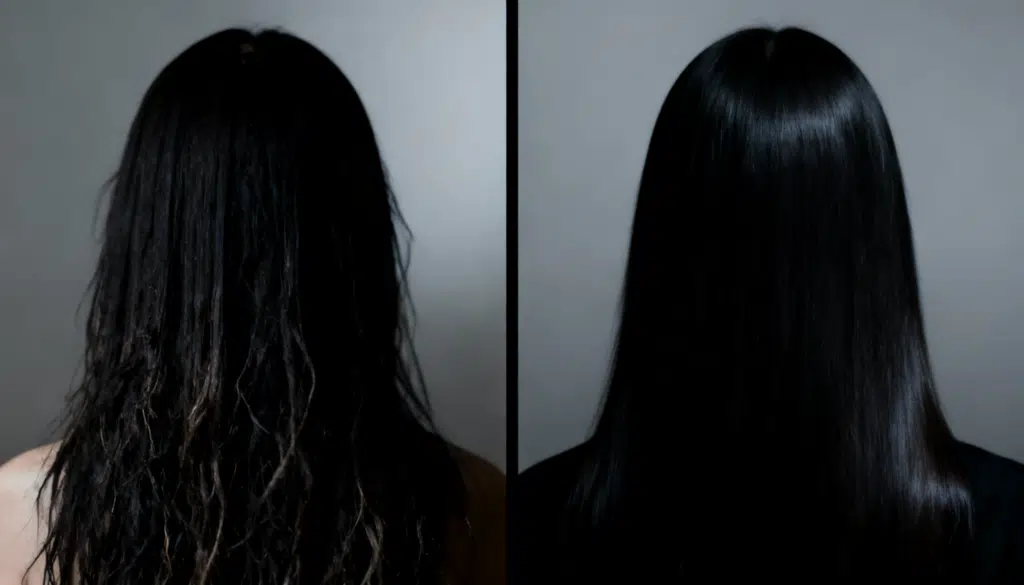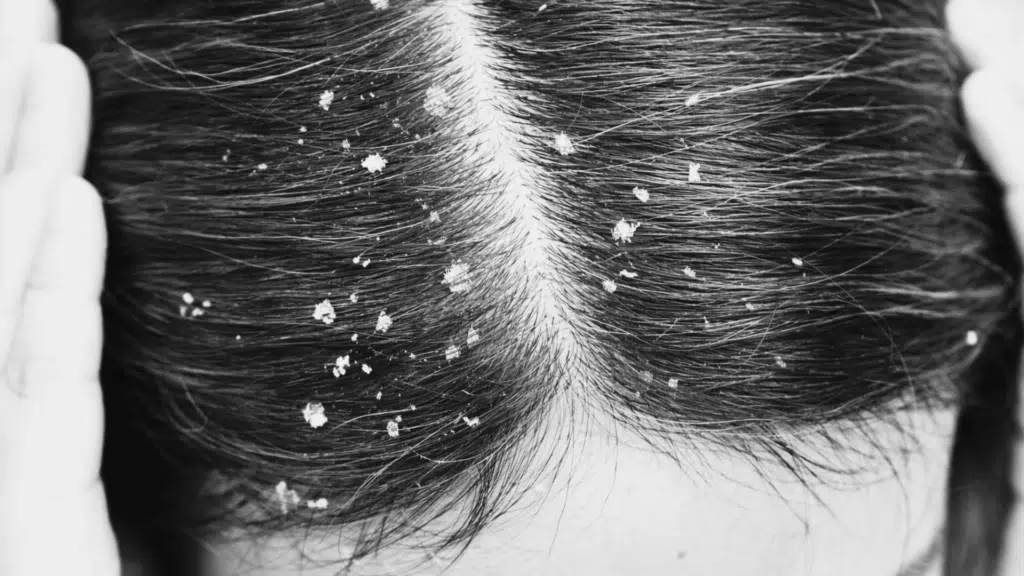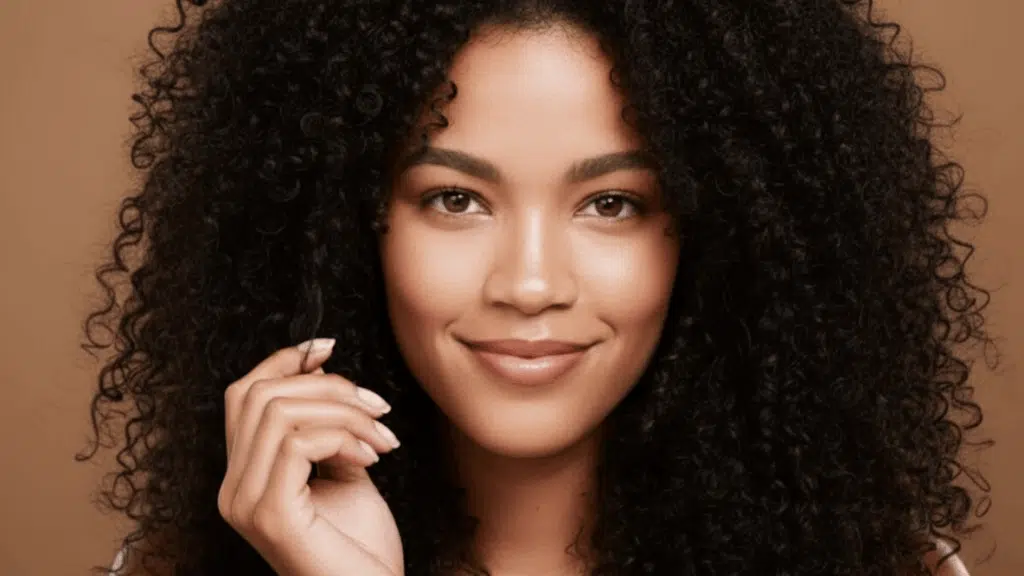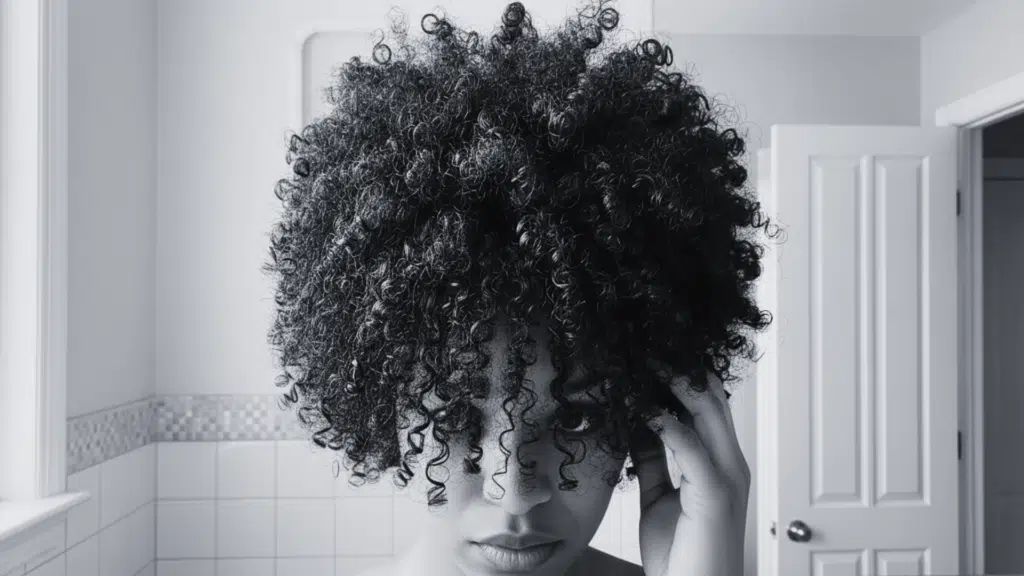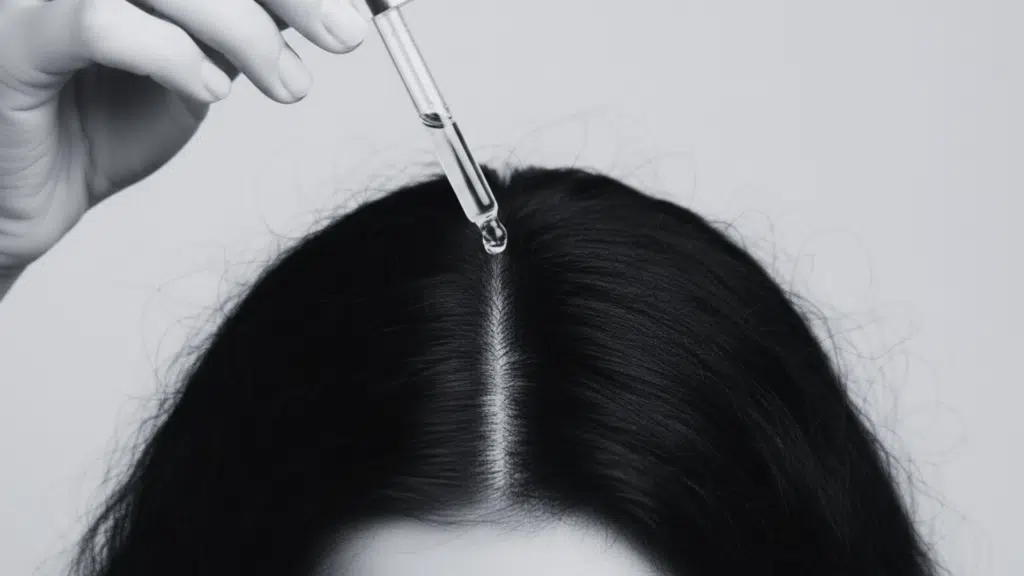Many people struggle with hair problems like thinness, slow growth, and a lack of shine. You’ve probably tried countless products and treatments, but the solution might be simpler than you think.
Good nutrition plays a huge role in hair health, and one nutrient stands out above the rest.
This blog will show you exactly how Vitamin A for hair can transform your hair from dull and weak to strong and healthy.
You’ll learn about the science behind vitamin A’s effects on hair growth, the best sources to include in your diet, and how much you actually need for optimal results.
The Role of Vitamin A in Hair Biology
Vitamin A comes in two main forms; retinoids from animal sources and carotenoids from plants (like carrots and sweet potatoes).
Your body converts both into retinoic acid, the active form your hair follicles use.
Cellular Differentiation and Hair Structure
Hair grows from complex pilosebaceous units (follicle + oil gland). Vitamin A for hair directs immature cells to develop into the specific types needed for strong hair and a healthy follicle structure. Without it, this system weakens.
Hair Follicle Cycling
Hair grows in cycles (growth, rest, shedding). Retinoic acid, formed from vitamin A in the scalp, is vital for hair follicle stem cells, the key regulators of hair growth, and for sebaceous glands, which produce sebum to keep hair moisturized.
Benefits of Vitamin A for Hair

When you get the right amount of vitamin A, your hair really shows it. This essential nutrient works quietly behind the scenes to keep your hair healthy and strong. Let me break down exactly how Vitamin A for hair benefits you.
- Supports natural oil production: Vitamin A helps your scalp produce sebum, which acts like your hair’s built-in conditioner. These natural oils keep your strands moisturized and protect them from daily damage.
- Promotes healthy cell growth: This nutrient plays a crucial role in cell division throughout your body, including hair follicle cells. When these cells can divide properly, they create stronger, healthier hair strands.
- Maintains scalp health: A healthy scalp provides the perfect environment for hair growth. Vitamin A helps maintain scalp tissue and keeps it functioning optimally.
- Improves hair follicle function: Your hair follicles need vitamin A to work at their best. It helps maintain follicle structure and supports the tiny blood vessels that deliver nutrients to hair roots.
- Enhances hair texture: With adequate vitamin A levels, many people notice their hair feels softer and looks shinier. This happens because the nutrient helps maintain the hair’s natural protective barrier.
- Supports normal growth cycles: Vitamin A helps regulate the hair growth cycle, ensuring follicles move through their phases at the right pace for healthy hair production.
Vitamin A Deficiency and Its Role in Your Hair Health
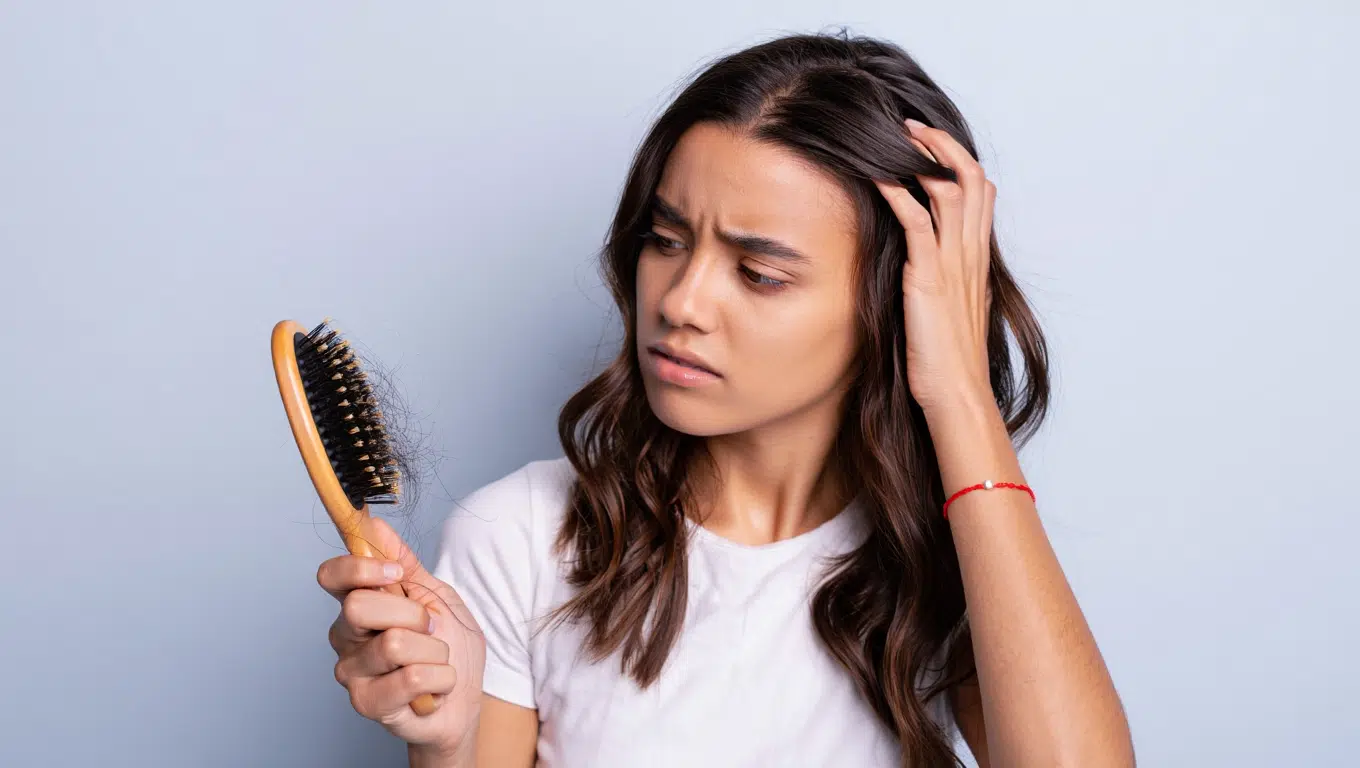
Vitamin A deficiency can impact hair health, although it is a relatively rare cause of hair loss in healthy adults. Here are the key ways vitamin A deficiency may affect hair:
1. Scalp Health and Sebum Production
It is crucial for the normal activity of sebaceous glands, which produce sebum, an oily substance that coats the scalp and hair shafts to prevent dryness.
When vitamin A for hair levels are too low, sebaceous glands produce less sebum. The scalp becomes dry, itchy, and flaky, creating a less hospitable environment for hair follicles. Reduced lubrication also increases friction and fragility along the hair shaft, leading to breakage. Over time, follicles may weaken, increasing the risk of shedding or slowed regrowth.
2. Cell Growth and Repair
Through its active metabolite retinoic acid, vitamin A regulates genes responsible for cell proliferation, keratin production, and epithelial tissue repair; all critical for healthy follicle function.
Low vitamin A slows the turnover of cells in the follicular matrix (where hair is formed) and the scalp’s epidermis. Damaged scalp tissues take longer to heal from microtraumas or irritation, stalling the growth of strong hair strands and leading to thinner, shorter, more fragile hair.
3. Blood Circulation
While not a direct vasodilator, vitamin A maintains the integrity of epithelial tissues and supports the production of molecules that ensure healthy microvascular networks in the skin.
Compromised epithelial health can affect small blood vessels in the scalp, reducing the efficient supply of oxygen and nutrients to hair follicles. Follicles undernourished for long periods may enter the telogen (resting) phase prematurely, slowing or halting hair growth.
4. Immune Function
Often called the “anti-infection” vitamin, it is essential for the maintenance of mucosal and skin barriers and the normal function of immune cells. This helps protect the scalp from microbial overgrowth and inflammation.
A weakened immune system may increase the scalp’s susceptibility to fungal infections (like dandruff or tinea capitis), bacterial folliculitis, or inflammatory dermatoses. These conditions can directly damage follicles or create an environment that hinders healthy hair growth.
5. Hair Texture
By regulating both sebum production and keratinocyte differentiation, vitamin A maintains the smooth cuticle structure and moisture levels of hair shafts.
Hair becomes coarse, dry, and brittle. The cuticle layer may lift and split more easily, leading to split ends and breakage. Over time, hair appears dull, lacks elasticity, and is more prone to mechanical damage from brushing or styling.
Vitamin A Excess (Hypervitaminosis A) and Hair Loss
Vitamin A excess, medically known as Hypervitaminosis A, creates a cascade of problems that directly cause hair loss.
When you consume too much vitamin A, it disrupts your hair’s natural growth cycle by forcing follicles into the resting phase too early. This means hair sheds faster than it can be replaced, leading to noticeable thinning.
The excess vitamin A then damages the follicles themselves by disrupting protein synthesis and weakening their structure.
Hair becomes brittle and breaks easily. Meanwhile, your scalp develops inflammation and sebum production goes haywire, creating an unhealthy environment. This toxic combination of shortened growth cycles, damaged follicles, and inflamed scalp tissue results in progressive hair loss that continues until vitamin A levels return to normal.
Treatment and Recovery for Vitamin A-Related Hair Loss
Restoring balance by reducing excess intake or correcting deficiency can reverse most vitamin A-related hair loss.
With proper diet and guidance, visible regrowth often begins within months, and full recovery typically occurs over time.
| Condition | Treatment | Expected Recovery |
|---|---|---|
| Vitamin A Toxicity (Excess) | Stop or greatly reduce excess vitamin A intake (supplements, fortified foods, high–vitamin A animal sources, topical retinoids). Support scalp health with gentle care; optional topical minoxidil to boost regrowth. | Hair regrowth usually starts in 2–3 months once levels normalize; full recovery in 6–9 months, depending on hair length and health. |
| Vitamin A Deficiency | Improve intake through beta-carotene-rich foods (carrots, sweet potatoes, leafy greens) or targeted supplements under medical supervision. Treat any underlying absorption or health issues. | Scalp and hair improvements within weeks to months, depending on severity and speed of deficiency correction. |
Conclusion
Getting the right balance of Vitamin A for hair is key to healthy locks. Too little can leave your scalp dry and hair weak. Too much can actually cause hair loss. The sweet spot lies in getting adequate amounts through a balanced diet.
Vitamin A works best as part of your overall nutrition plan, not as a magic solution. If you’re dealing with hair loss, consider other factors like iron, B vitamins, and overall health first.
Most people get enough vitamin A naturally, so focus on eating well rather than taking high-dose supplements.
Your hair reflects your overall health; treat your body well, and your hair will thank you.




